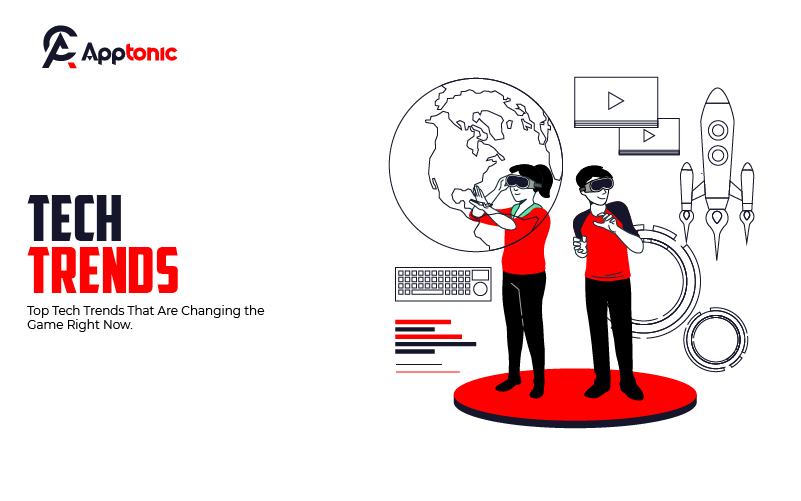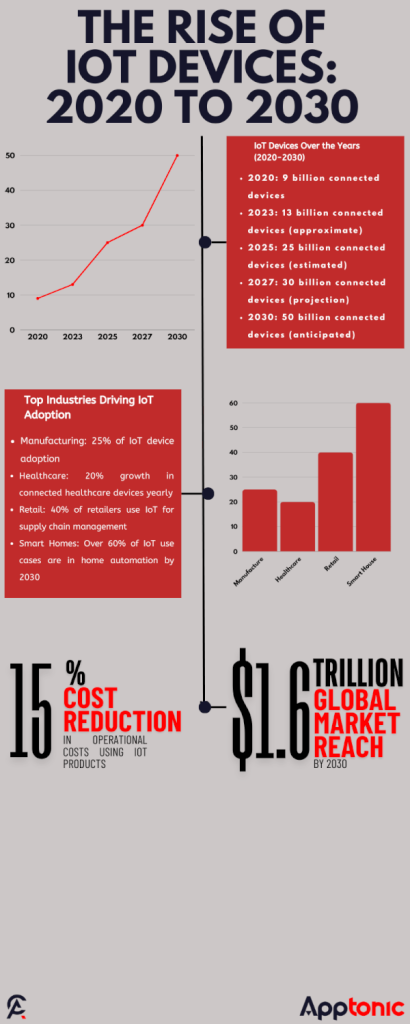If you’re wondering what the hottest tech trends are right now, you’re in the right place. This isn’t going to be some fluffy, long-winded exploration. We’re diving straight into the facts—the stuff that’s actually changing the game. We’ll show you how IoT is reshaping everything from logistics to personal health, why AI is the new electricity, and how mobile app development continues to dominate with new innovations. Need a mobile solution? Our mobile app development services are tailored to help you ride these trends smoothly. Whether you’re a startup or a business looking for a solid tech partner, our approach might be just what you’re looking for.
AI and Machine Learning: The Tech Titans
Artificial Intelligence (AI) and Machine Learning (ML) aren’t just buzzwords anymore. They are predicted to add around $15.7 trillion to the global economy by 2030. Companies that adopt AI are seeing a 40% boost in productivity, compared to those still on the sidelines. If you’re still not convinced AI is a must-have, just consider how it’s affecting industries like customer service, e-commerce, and healthcare. We see this change firsthand when integrating AI-driven solutions into our apps. Not getting on board? You’re essentially losing money.
AI is revolutionizing the healthcare industry by enabling predictive diagnostics, personalized treatment, and faster drug discovery. For example, AI-driven diagnostic tools have shown an accuracy rate of 87%, outperforming human doctors in certain cases. Retail is another industry experiencing a transformation. AI-powered recommendation engines are boosting sales by up to 29%, providing personalized shopping experiences that drive customer loyalty. These trends aren’t slowing down; in fact, they’re accelerating. Businesses that adopt AI can streamline operations, enhance customer experiences, and make data-driven decisions that lead to substantial growth.
One area where AI is making significant strides is in natural language processing (NLP). NLP is helping businesses improve their communication with customers by providing more accurate chatbots and virtual assistants. According to recent data, 65% of consumers prefer interacting with a company that offers AI-driven support because it provides instant responses and resolves issues faster. The rise of Generative AI tools is also enabling companies to create content at scale, saving both time and money.
The Internet of Things (IoT): The Network Effect
Here’s a number for you—25.4 billion connected devices by 2030. IoT is taking over, whether it’s automating factories or making your smart home smarter. Imagine being able to track your entire fleet of delivery trucks in real time, with predictive maintenance that reduces downtime by 30%. We’re already integrating IoT into projects for clients looking to capitalize on this tech. Want to talk about your next app project with IoT integration?
The influence of IoT isn’t just limited to industries like logistics and manufacturing. In healthcare, connected medical devices are enabling continuous patient monitoring, leading to 20% fewer hospital readmissions. Smart cities are another area where IoT is making a difference—traffic management systems using IoT can reduce congestion by up to 25%, improving the quality of life for urban residents. Smart homes are also becoming a norm, with the market for connected home devices expected to reach $157 billion by 2025. From smart thermostats to connected lighting, IoT is making homes more energy-efficient and comfortable.
In agriculture, IoT is driving precision farming by providing real-time data on soil conditions, weather forecasts, and crop health. This results in optimized yields and reduced resource usage. For instance, IoT-enabled irrigation systems can lower water consumption by 35%, making farming more sustainable. As IoT devices become more sophisticated, the data they generate is creating opportunities for enhanced analytics and improved decision-making across multiple sectors.
Blockchain Beyond Crypto
Let’s move past the hype of Bitcoin for a second. Blockchain is now a part of industries like supply chain management, healthcare, and finance. It offers something that today’s consumers crave: transparency and security. For instance, 81 of the top 100 public companies are actively exploring blockchain, not because it’s cool, but because it works. Secure, transparent, and efficient—it’s a trifecta that keeps customers loyal.
Blockchain’s impact on supply chain management is particularly noteworthy. By using blockchain, companies are able to track products from the point of origin to the consumer, ensuring authenticity and reducing fraud. Walmart, for example, uses blockchain to track the supply chain of leafy greens, reducing the time it takes to trace produce from 7 days to 2.2 seconds. In healthcare, blockchain is being used to secure patient records, giving patients control over their data while ensuring privacy.
In the financial industry, decentralized finance (DeFi) is disrupting traditional banking by providing open access to financial services without intermediaries. The DeFi market has grown to over $100 billion, offering services like lending, borrowing, and asset management. This shift towards decentralized solutions is giving consumers more control and transparency in their financial dealings. Additionally, smart contracts are automating complex processes in industries such as insurance, reducing administrative costs and speeding up claims processing.
Mobile App Development: Leading the Charge
More than 6.8 billion people have smartphones today. That’s nearly 85% of the world’s population. Mobile apps aren’t just optional anymore; they’re the cornerstone of customer engagement. Statistically, companies with a solid mobile app see higher engagement rates by 53% compared to those without one. If you’re looking to develop an app that gets results, having a well-structured strategy is crucial.
The demand for mobile apps continues to skyrocket, driven by consumer expectations for convenience and personalization. In 2023, mobile apps are expected to generate $935 billion in revenue, with the average smartphone user spending 4.8 hours per day on their device. Businesses that invest in mobile app development are seeing increased customer loyalty, improved brand recognition, and higher conversion rates. Startups that invest in Android app development show even better results.
One trend gaining traction in mobile app development is progressive web apps (PWAs). PWAs offer the benefits of a mobile app without requiring a download, providing a seamless user experience that boosts engagement. Companies adopting PWAs report a 68% increase in mobile traffic and a 52% improvement in conversions. Additionally, the rise of 5G technology is enabling developers to create more immersive and responsive apps, including AR and VR experiences that were previously limited by network speeds.
Augmented Reality (AR) and Virtual Reality (VR): The New Experience Standard
AR and VR are no longer just for gamers. These technologies are becoming an integral part of customer experiences, training programs, and product demonstrations. By 2025, the AR/VR market is projected to reach $296.9 billion. Retailers are using AR to let customers try before they buy, boosting conversion rates by 40%. Meanwhile, VR is being used for immersive training experiences in industries like healthcare, military, and manufacturing.
IKEA‘s AR app, for example, allows customers to visualize furniture in their home before making a purchase. This kind of interaction not only improves customer satisfaction but also reduces return rates. In education, VR is transforming classrooms by providing immersive learning experiences that make complex subjects easier to understand. Businesses that adopt AR and VR can provide unique experiences that differentiate them from competitors, making these technologies a powerful tool for customer engagement.
Cloud Computing: Scalability and Security
Cloud computing is at the core of digital transformation. Companies are moving to the cloud to scale operations, enhance collaboration, and reduce costs. In 2023, 94% of enterprises are already using cloud services. The shift to cloud infrastructure is driven by its ability to provide on-demand resources, reduce hardware dependency, and improve data security. Cloud platforms like AWS, Azure, and Google Cloud are leading the charge, providing businesses with the tools they need to innovate and grow.
The benefits of cloud computing extend beyond scalability. It also plays a crucial role in disaster recovery and business continuity. Companies that leverage cloud services experience 80% faster recovery times compared to those relying on traditional on-premises solutions. Moreover, serverless architecture is gaining traction as it allows developers to focus on building features rather than managing infrastructure, speeding up time-to-market and reducing operational complexities.
Cybersecurity: Protecting the Digital Frontier
With the rise of connected devices and digital services comes an increased risk of cyberattacks. Cybersecurity has never been more critical, with 68% of business leaders feeling that their cybersecurity risks are increasing. In 2023, the average cost of a data breach is $4.45 million, making robust security measures a top priority for businesses. From end-to-end encryption to multi-factor authentication, companies are investing in technologies that safeguard their data and maintain customer trust.
The adoption of zero-trust architecture is becoming a key trend in cybersecurity. Zero trust assumes that threats could be internal or external, and therefore every request must be verified. This approach has been shown to reduce security incidents by 50%. Additionally, AI-driven cybersecurity is enhancing threat detection and response capabilities, allowing companies to identify vulnerabilities before they can be exploited. As businesses become more reliant on digital operations, the importance of investing in cybersecurity cannot be overstated.
Conclusion
Ignoring these trends isn’t an option. They’re shaping the future, and if you’re not adapting, you’re falling behind. AI, IoT, blockchain, AR/VR, cloud computing, and cybersecurity—these aren’t just future concepts; they’re shaping today’s reality. Staying ahead of these trends will ensure long-term success in an increasingly digital world.
Skyler Collins
- Skyler Collins
- November 14, 2024
- 3:32 pm


